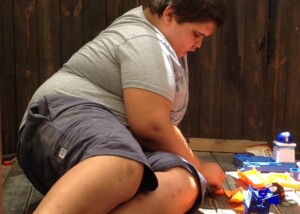Your child could be autistic without you realizing it.
Here are reasons you may not have even considered that could be making you miss autism signs.
You may have already read online articles about signs of autism in children.
But almost always, that information is generic, quite broad and even confusing.
Though pronounced autism is obvious, mild autism can stealthily cruise under the radar.
If you sometimes wonder if your daughter or son is on the Autism Spectrum, but then you keep withdrawing that thought, here are nine reasons why you keep going back and forth.
I received a formal diagnosis of Autism Spectrum Disorder well into adulthood.
Reasons a Parent May Not Realize Their Child Is on the Autism Spectrum

©Lorra Garrick
#1. Obedience is next to godliness.
My parents, especially my mother, put a hefty premium on obedience in their children.
I did what I was told. That’s kind of all that mattered to them. I say “kind of” because of course, other things mattered, too, like not leaving messes around the house.
If I had a toy all over the living room floor, I was expected to put it away when I was done. And I did.
I went to bed when I was told. I did this, this and that according to house rules. I liked taking baths.
I was a “good” child who didn’t cause mischief at school. My parents never received calls from teachers reporting that I was stealing or being disruptive, etc.
Obedience or ability to follow rules significantly dampens a parent’s perception that the child might have a “condition” that’s described in psychiatric literature.
#2. You’re not spending enough time with your child.
My parents didn’t know me, when I was a child, as much as they could have and should have.
My father worked full-time, and in addition, conducted choirs for several churches all throughout my childhood. My mother played the organ for those choirs.
Their passion for church choirs meant a lot of time away from the house (I was the youngest of six kids; there were always older siblings to watch the house).
For most of my childhood my mother was stay-at-home, but she wasn’t the type of mom who liked to get down on her knees and play with her children.
She was more about taking care of our physical needs and making sure we followed the rules.
This parenting style cheated them out of realizing just how unusual my way of seeing the world really was.
For instance, neither of my parents knew that I was at one point intrigued by worn-down shoe heels, phone number exchanges and comas.
My parents had no idea that I wished I’d get hit hard enough in the head to be in a coma.
GET TO KNOW YOUR CHILD! You might then realize, “Hey, are these interests normal for children?” This could lead to an autism assessment.
#3. Mistaking a weird interest for being a smart kid.
What parent doesn’t want a smart kid? Parents like to see signs that their child is exceptionally bright.
And maybe that’s what my mother perceived whenever she saw me sitting on the den floor, studying the big colorful globe.
She never asked what I was looking at. The fact that I was inspecting it was good enough for her as she went about her household duties.
I loved reading the names of Japanese cities on this very detailed globe. I was intrigued by how so many ended in “i.”
Unusual interests are very common in autism, and should be a red flag in the context of social awkwardness or lack of friends.
There was only one girl in grade school whom I talked to on the phone and whom I had over the house more than once.
#4. Passing off collecting objects as a “kid’s hobby.”
Little did my parents know just how desperately I wanted every type of seashell in the world.
My parents said “no” a lot. This cheated them from knowing how intensely fascinated I was with seashells.
I had a small collection – whatever I could get my hands on while growing up in Cleveland in the 1960s and 1970s.
Thus, the collection was limited, but I kept my enthrallment to myself. There was no point in expressing it if I couldn’t have every seashell out there.
#5. Mistaking doing the same thing over and over for good behavior or creativity.
My mother lived by the motto, “Children should be seen and not heard.”
Well, I was seen a lot around the house, but not heard, while I spent lengthy amounts of time “playing” with my Etch-A-Sketch and using the ViewMaster (an old-fashioned device that you stuck a ring of picture slides into, then viewed through a special lens that made it appear that you were standing within the scene).
I began drawing when I was very young. For about 10 evenings in a row one holiday season I sat at the dining room table (same chair, always a mug of hot chocolate) and drew, on a blank sheet of paper, this blonde, curly-haired girl who was illustrated on the cover of a Christmas carol book.
“She’s gonna be an artist when she grows up,” thought my parents, rather than, “Why does she keep drawing the same thing over and over and over?”
#6. Seeing your child’s lack of friends as a convenience rather than as a problem.
My mother was fine that I was usually somewhere in the house or outside on our property, rather than off somewhere unknown with friends she’d never met.
I did many things by myself: drawing, coloring, looking through my seashell book, watching TV game shows, tossing a tennis ball against the brick house, riding my bike, lying in the sun, running through the sprinkler, using the ViewMaster, etc.
I never showed interest in doing activities with other children during grade school except for that one friend.
I did ask for a party once, though, for my eighth birthday. What kid doesn’t, sooner or later? But one was enough for me.
In eighth grade I hung out with several girls. Things just magically clicked during that year.
After that year, when we all went our separate ways to different high schools, my social life was dead in the water.
But that was okay with my parents because they always knew where I was on weekend nights: safe in my bedroom. I was one less kid they had to worry about getting caught up with the wrong crowd.
There were no playdates my mother had to hassle making, no other moms she had to bother with meeting, no having to leave housework to drive me to some kids’ house.
I occasionally played with the younger girl next door, but she was a playmate of convenience. We had nothing in common.
I’m sure my parents wished, at one or more points, that I had more friends, but good grades and good behavior always superseded that.
#7. “I was like that when I was that age.”
The parent (who’s autistic and doesn’t realize it) sees a bit of themselves or even a lot of themselves in the child, and thus, thinks their child is “normal.”
#8. The parents aren’t very social themselves.
Though my parents were on bowling leagues, they weren’t classically social.
They were quiet bowlers and enjoyed the competitive nature of throwing a heavy ball to knock down pins.
They never had friends over when I was growing up except maybe a few times my mother might’ve had a woman over, and my father might’ve had “Jerry” over, who was a choir member. I do recall we all one day went to Jerry’s house.
But essentially, they had no conventional social life, even though they considered their choir members and bowling teammates their “friends.”
#9. No meltdowns!
My parents had no reason to have me evaluated for anything as long as I was “well-behaved” and could be taken anywhere in public without worrying I’d lose control.
In fact, when my mother taught music theory at college, she’d bring me – age three – with her and sit me in the corner of the classroom with some toys.
Then she’d teach while I stayed put and quiet! My autism meant I had no need to seek attention from all the strange adults in that room whom she was talking to.
As an autistic preschooler I was quite content in my own littler private world in that corner! It’s AUTism: unto oneself.
So there you have it: nine reasons you may not realize that your child is actually autistic.
If any of these reasons resonate with you, you’ll want to consider having your child assessed for Autism Spectrum Disorder.
 Lorra Garrick has been covering medical and fitness topics for many years, having written thousands of articles for print magazines and websites, including as a ghostwriter. She’s also a former ACE-certified personal trainer. In 2022 she received a diagnosis of Level 1 Autism Spectrum Disorder.
Lorra Garrick has been covering medical and fitness topics for many years, having written thousands of articles for print magazines and websites, including as a ghostwriter. She’s also a former ACE-certified personal trainer. In 2022 she received a diagnosis of Level 1 Autism Spectrum Disorder.
.



























